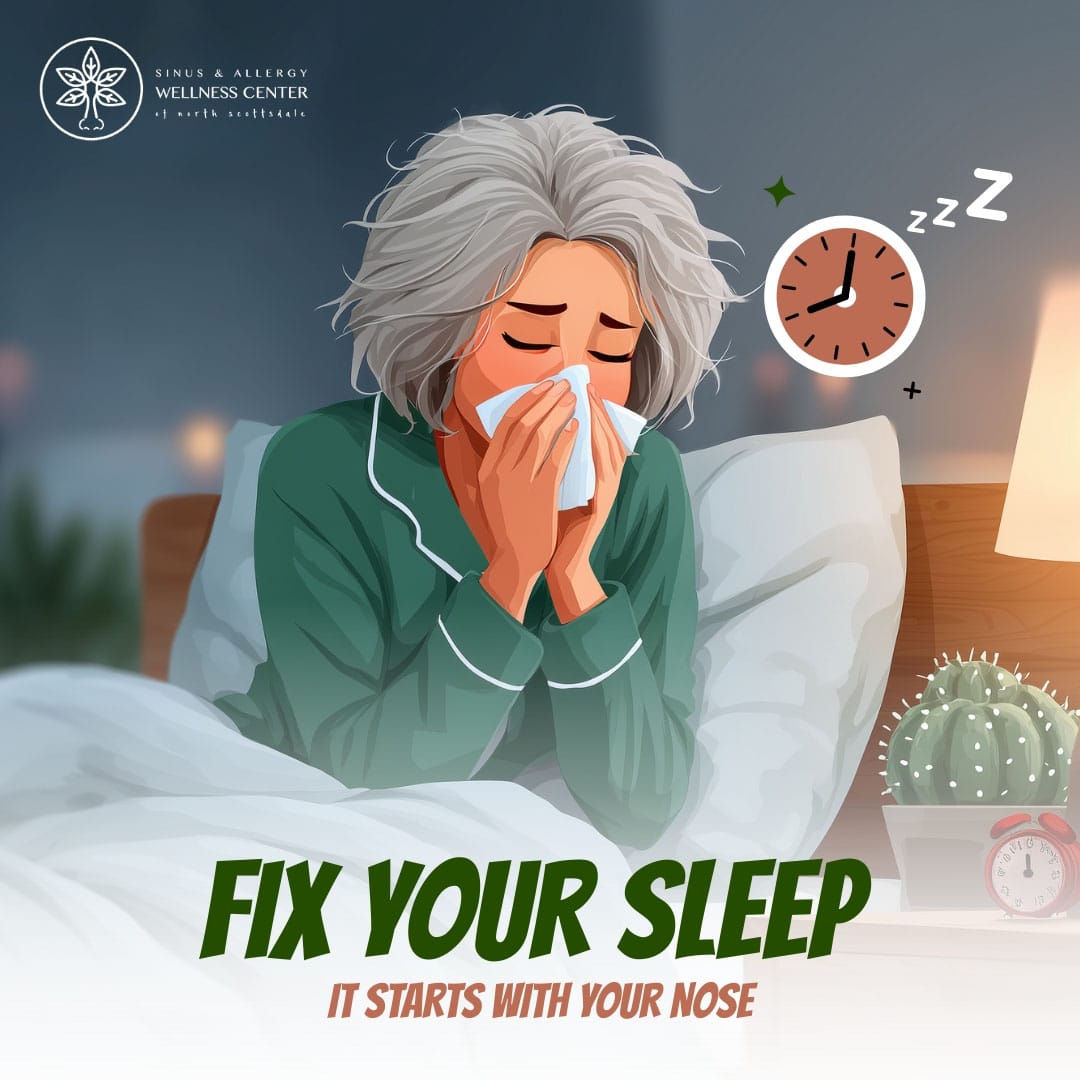Fix Your Sleep – It Starts With Your Nose
Are you someone who keeps your bedroom at a cool 65 degrees, invests in good quality bedding, eats dinner earlier in the evening, puts away the screens before bed, and gets 7-8 hours of sleep… but yet, you’re still somehow not getting quality sleep?
The reality is, you might be doing everything right for a perfect night of sleep but your nose might be the culprit.

How Nasal Obstruction Affects Sleep Quality in Scottsdale Residents
Nasal obstruction happens when your nose is blocked up and you can’t breathe out of your nose. This can significantly interfere with healthy breathing and sleep. While you can breathe in and out of your mouth when breathing, there’s evidence that proves that nose breathing is far better for you than mouth breathing—and it even goes back to evolution and how we primarily breathe out of our noses as newborns.
Some of the benefits to nose breathing include:
- Filters allergens and irritants
- Humidifies and warms the air
- Promotes better oxygen exchange
- Calms our nervous system by helping us to return to the “rest and digest” mode and out of the “fight or flight” mode
- Supports more restful and restorative sleep
Consequences of chronic mouth breathing during sleep:
- Dry mouth
- Snoring
- Disrupted sleep cycles
- Increased risk of obstructive sleep apnea (OSA), which puts us at risk for rising blood pressure, increased heart rate, heart attacks, sudden cardiac death and strokes
How to Know if Your Nose is Ruining Your Sleep
If you’re experiencing nasal obstruction, you might notice:
- Nighttime congestion or difficulty breathing through the nose
- Snoring or noisy breathing
- Waking up tired even after a full night’s sleep
- Frequent nighttime awakenings or dry mouth
Underlying causes of nasal obstruction may include:
Sinus infections: Sinus infections happen when your sinus passages get inflamed, often after allergies or a cold. They can cause significant facial pain or pressure, especially around your forehead, nose, and eyes. Unlike colds or the flu, a sinus infection may bring on thick, yellow, or greenish nasal discharge.
Allergies: An overreaction of the immune system to harmless irritants called allergens. There’s a new spike in allergies in the Phoenix and Scottsdale areas happening in the early fall.
Nasal polyps: Nasal polyps are soft, non-cancerous growths that form in the lining of your nasal passages or sinuses. They can block airflow and trap mucus, leading to constant congestion or infections.
A deviated septum: The septum is the thin wall that separates your left and right nasal passages. If it’s crooked or off-center (which is surprisingly common), it can block one side of your nose, making it harder to breathe or drain properly.
Turbinate hypertrophy: Turbinates are narrow passageways that warm and moisten the air in your nose. If your turbinates are too large, they block airflow.
How Nasal Obstruction Contributes to Sleep Disorders
If you’re not sleeping well for long periods of time, you may develop a sleep disorder. Chronic nasal obstruction can be linked to sleep-disordered breathing, and you may experience snoring or sleep apnea. Sleep apnea is a disorder in which breathing is interrupted during sleep. A blocked or collapsed airway is the most common cause, which can stem from obesity, a deviated septum, alcohol consumption, low humidity, allergies, and sinusitis. Symptoms of sleep apnea include snoring, gasping or choking during sleep, excessive daytime sleepiness, and headaches upon waking. Sleep apnea, as mentioned above, can have serious health consequences, including high blood pressure, heart disease, and stroke.
If left untreated, nasal obstruction can lead to mouth breathing and interrupted sleep, which can cause fatigue and mood swings, which can negatively impact your quality of life.
How the Sinus and Allergy Wellness Center Can Help
Schedule a visit with the team at Sinus & Allergy Wellness Center in Scottsdale today—we can provide a comprehensive nasal and sinus evaluation, and can provide various treatment options on-site including:
- Allergy testing and treatment: Allergy testing helps identify specific triggers. Allergy testing can help identify specific triggers such as pollen, mold, pet dander, or certain foods. We will determine which tests are medically appropriate for your individual situation.
- Balloon sinuplasty, turbinate reduction, swell body correction: For some patients whose allergies have contributed to chronic sinus issues, balloon sinuplasty with these other procedures may be recommended. These minimally invasive procedures gently open blocked nasal and sinus passages and are typically performed comfortably in-office all in under an hour. Many patients report shorter recovery times compared to traditional sinus surgery, though comfort and healing experiences can vary.
Conclusion
Fixing your nose may be the missing piece in your sleep puzzle since your sleep quality is directly linked to how well you can breathe through your nose.
If you’re struggling with fatigue, snoring, or poor sleep and feel like you’ve tried everything for better quality sleep, don’t overlook your nasal health. Contact the Sinus and Allergy Wellness Center of Scottsdale for a consultation so you can breathe easier and sleep better.
Disclaimer:
The information provided in this article is for informational and educational purposes only and does not constitute medical advice. It is not intended to diagnose, treat, cure, or prevent any disease or medical condition. Always seek the guidance of your physician or other qualified healthcare provider with any questions you may have regarding a medical condition or treatment.
Results may vary: Treatment outcomes and health experiences may differ based on individual medical history, condition severity, and response to care.
Emergency Notice: If you are experiencing a medical emergency, call 911 or seek immediate medical attention.



